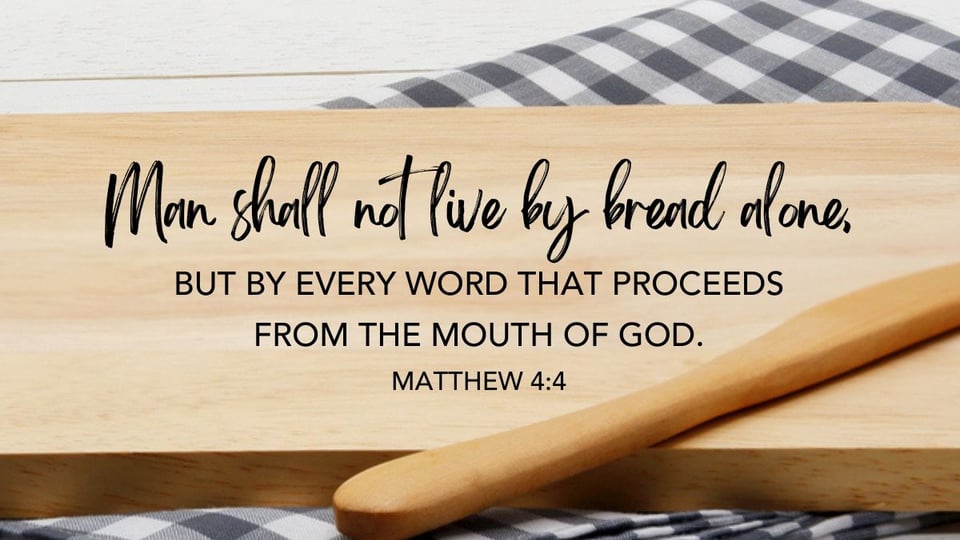The Meaning of Matthew 4:4: “Man Shall Not Live by Bread Alone”
We need physical food to live, but it can sustain us for only so long. The Bible contains the words of God—spiritual food that leads to eternal life!

The battle had begun.
Jesus Christ had been fasting. For 40 days, He had not eaten. Matthew’s Gospel records one of the greatest understatements in the Bible: “Afterward He was hungry” (Matthew 4:2).
Satan challenged Christ by saying, “If You are the Son of God, command that these stones become bread” (verse 3).
Satan wasn’t just exploiting Jesus’ human need for food. Satan was trying to get Christ to walk into his trap and sin against God by placing His needs above what God expected of Him.
But Christ didn’t take the bait.
In response to Satan’s challenge, Jesus replied with the written words of God: “Man shall not live by bread alone, but by every word that proceeds from the mouth of God” (verse 4).
What does this verse mean, and why did Jesus quote it at this crucial moment?
Our dependence on God
When our physical needs for food, water, clothing and shelter are taken care of, we don’t tend to think very much about how we depend on those things. We naturally take them for granted. But without food or water, we will not live long. Without clothing and shelter from the elements, extreme temperatures will ultimately overtake us.
This highlights an important truth: We are not totally self-sufficient. No matter our wealth or ability, we all will eventually die. No amount of food or shelter can prevent death. It is God who gave us life in the first place. It is God who provides us with the air we breathe and the food we eat.
Only God can give us a life without end.
It is God who gave us life in the first place. It is God who provides us with the air we breathe and the food we eat. Only God can give us a life without end.
Interestingly, Christ quoted a verse from the Old Testament: Deuteronomy 8:3. Consider the context of this verse. Moses was talking to the ancient Israelites shortly before they entered the Promised Land—a land where they’d have access to abundant food and resources.
Moses reminded them how God had provided for them during the 40 years they had wandered in the wilderness. God was the One who fed them, gave them water, kept their clothes from wearing out and protected them from the elements.
Notice what Moses said: “Every commandment which I command you today you must be careful to observe, that you may live and multiply, and go in and possess the land of which the LORD swore to your fathers. And you shall remember that the LORD your God led you all the way these forty years in the wilderness, to humble you and test you, to know what was in your heart, whether you would keep His commandments or not.
“So He humbled you, allowed you to hunger, and fed you with manna which you did not know nor did your fathers know, that He might make you know that man shall not live by bread alone; but man lives by every word that proceeds from the mouth of the LORD” (Deuteronomy 8:1-3, emphasis added).
The context of this passage is about the importance of obedience. In essence, God was telling them that they should depend more on His blessings for obedience than on food. When Christ quoted this verse, He was reiterating the truth that obeying God is more important than having a full stomach.
But why does obedience outrank the importance of physical food?
Jesus Christ and the bread from heaven
Bread is perhaps the most common food in the world. In fact, for thousands of years people have equated bread with food.
As we read in Deuteronomy 8, God miraculously provided the Israelites with food. Six days a week, for 40 years, the Israelites found “bread from heaven” on the ground in the morning. The only day when it didn’t rain manna was the Sabbath, but the Israelites were given a double portion on the sixth day to last them until the end of the seventh day (Exodus 16:4-35).

How could that be?
The apostle Paul made it clear that the One who led the Israelites to the Promised Land was Jesus Christ (1 Corinthians 10:1-4). (To learn more, read “Jesus in the Old Testament?”)
This is one reason Christ could claim that He is the bread of life!
In His discussion about the bread from heaven, Christ told those present that all those who ate the manna were sustained for only 40 years. The manna did not give them eternal life; they all eventually died (John 6:49).
Jesus was saying that His words are the true bread from heaven because they lead to eternal life (verses 51, 63). Scripture is clear that the path to eternal life is through Jesus Christ and His words.
Seeking God’s righteousness
Unlike most who heard Jesus, Peter showed a level of understanding. He affirmatively stated that Jesus had “the words of eternal life” (verse 68).
In the Sermon on the Mount, Christ said that those who hunger and thirst for righteousness will be filled (Matthew 5:6). When one is hungry or thirsty, he or she wants to have those needs satisfied. In the same way that we want to fulfill our physical needs, God wants us to desire to satiate our spiritual needs through living by His words and commandments.
Just as people cannot grow physically if they neglect food and water, we cannot grow spiritually if we neglect studying and living in accordance with God’s Word.
Yes, bread—food—is important because we would not live long without it. But no matter how much physical food we eat, we will still ultimately die, just as the Israelites died centuries ago. But the bread from heaven, the Word of God, is the spiritual food that leads to eternal life.
Just as physical bread must be digested by the body to help us grow, God’s Word must be spiritually digested—be put into practice—in order for us to grow spiritually (James 1:22-25). The more we study and apply the Scriptures, the more we will grow spiritually (Hebrews 4:12).
Yes, when we consistently feed on the Holy Scriptures, we are not living by bread alone but by every word that proceeds from the mouth of God!
Date Posted: April 15, 2024



